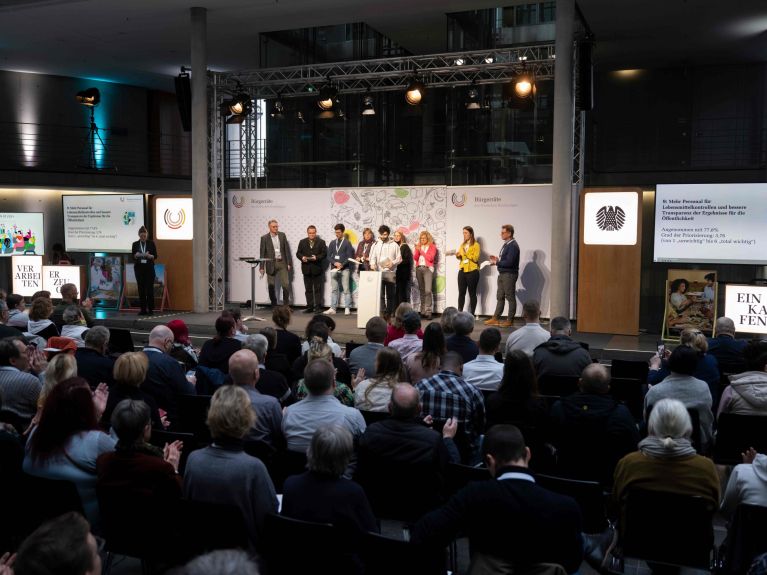“Strengthen democracy by giving people many opportunities to experience democracy”
Claudine Nierth from the Mehr Demokratie association tells us how referendums and citizens’ councils can complement parliamentary elections.

Claudine Nierth, Article 20 of the German Basic Law says that “All state authority is derived from the people.” Do you think parliamentary elections are enough for that?
The article talks about elections and other votes. At a national level, this involves a promise which has not yet been kept, as there are no national referendums. For me, we are making too little use of what citizens can do if they only get to vote in 10-15 federal general elections in their lifetime. In addition, the best way to strengthen democracy is by giving people many opportunities to experience democracy. There are already opportunities to participate in direct democracy through referendums at the level of federal states and municipalities.
![Claudine Nierth, spokesperson for the Mehr Demokratie [More Democracy] association Claudine Nierth, spokesperson for the Mehr Demokratie [More Democracy] association](/sites/default/files/styles/image_carousel_mobile/public/media/image/bundesvorstand-nierth.jpg?itok=sopH5xro)
But there are concerns that referendums are more susceptible to populist demands and can contribute to the polarisation of society.
At the moment we are seeing how right-wing populists are trying to undermine parliaments. Tools for direct democracy can debunk populism. For example, there are tests to see if demands are even in accordance with the Basic Law. You can counter the risk of polarisation by having citizens’ councils consider an issue before putting it to a referendum. Councils like this can provide information for the vote and make recommendations.
So do you want to combine different forms of democratic participation?
Exactly. Little by little, municipalities and federal states are already testing different ways of combining these forms. For me the ideal approach is the way different opportunities are combined in Ireland. There they have a strong parliament but it also takes advice from citizens’ councils on a range of issues. Where recommendations are made, the public decides on changes to the constitution in referendums.
This was how they tackled two questions which politicians in Ireland, which is heavily influenced by the Catholic church, had previously not dared to address: the right to abortion and same-sex marriage. Citizens’ councils spent over six months considering these issues and in the end recommended on the basis of a two-thirds majority that abortion should be legalised and same-sex marriage should be introduced. These recommendations achieved the necessary two-thirds majorities in referendums and are now enshrined in the constitution.

In Germany, the first citizens’ council appointed by the Bundestag presented its recommendations on the topic of “Food in Transition” in early 2024. What is your assessment of the council’s work and its conclusions?
Those involved took their work very seriously. They got up to speed on the detail and ultimately drew up nine recommendations for policymakers. They also demonstrated great social awareness and never put their own interests first, as many would probably accuse them of doing. They put free and healthy lunch for all children in nurseries and schools at the top of their list. But they also considered how a service like this could be funded. So they suggested that, instead of passing on any future increases in child benefits to parents, to use this to fund free lunches. Overall, members of the public gave very nuanced responses.
The main point is that policymakers are taking citizens seriously.
A citizens’ council should always represent a cross-section of society. How can that be brought about?
The most important thing about a citizens’ council is that its members should be chosen at random. Those involved are picked from across the whole country and anyone can be selected. Members of the public who are chosen then get surveyed on points such as their gender, level of education and where they live, so that in the end the group presents a cross-section of society. When assembling the citizens’ council on food, potential participants were also asked about their eating habits. This made sure that only 2% of participants are vegan and 10% are vegetarian, in line with their share of society as a whole.
What actual consequences should follow from the recommendations of a citizens’ council?
The main point is that policymakers should take citizens seriously. For instance, they should always get an answer about which proposals are being taken up, which have been rejected and which proposals have not yet been considered. That said, the public do not expect all recommendations to be implemented one to one.


